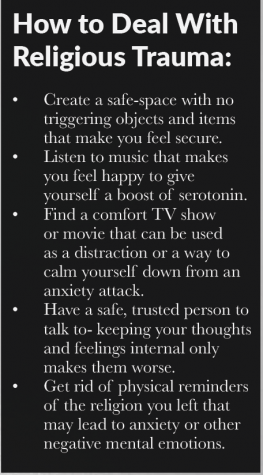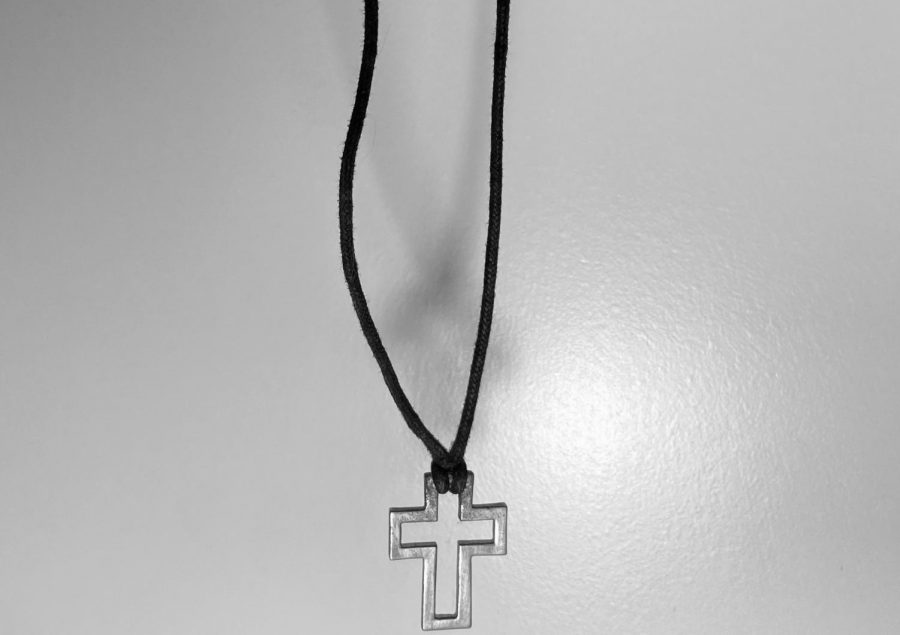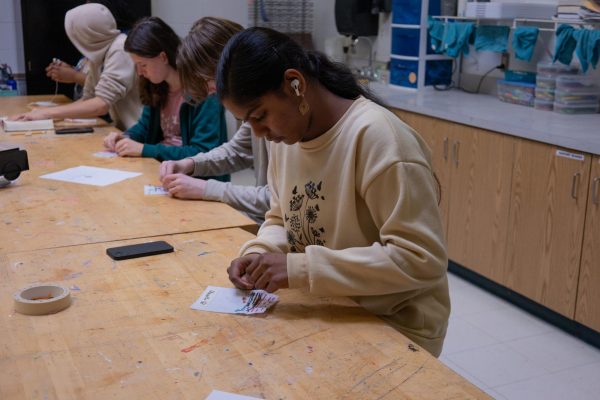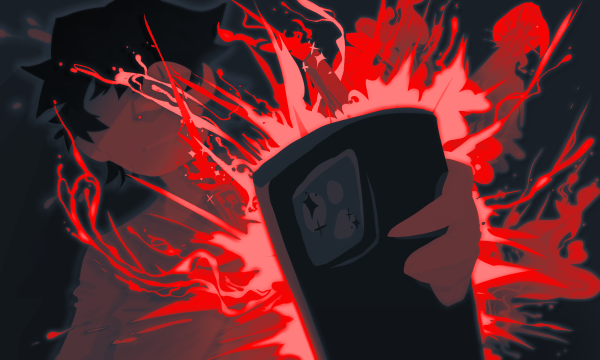Trapped in Religion
The unseen reality of coping with religious trauma and leaving an organized religion
A necklace that bears the religious image of a cross is dangling, ready to drop. Letting go of something that was once so personal is very difficult no matter the circumstances; however, with religion there’s a little more. The massive stigma around this act only accentuates these feelings.
Religion is something that is very personal to a lot of people. It starts as a seed implemented into the minds of infants by their loving family. Then it blossoms into the core of human existence. From there on it becomes a defining aspect of them as a person. For the majority of the population that identifies as religious, the religion they partake in is one that they were brought up in from early childhood. I was one of these people.
I grew up in a Christian household, resulting in a decently-sized portion of my earliest memories being centered around church. From infancy, church on Sundays was a regular occurance as well as Vacation Bible School every summer. There’s even a home video where one of my parents lovingly tells two-year-old me to “say Jesus” from behind the camera, to which I happily obliged. There was no questioning; I wasn’t supposed to. Instead, I merely took in all the information given to me at church without any outside knowledge.
The first time that my mind allowed itself to question what it was being fed on Sundays was around the age of 12 or 13. That’s when sermons started to reveal what this religion really entailed. Starting then and in the years following were sermons on a variety of topics including two (almost three) on why being a part of the LGBTQ+ community is wrong, one on why women need to be subservient to men, and one on why having anxiety means you’ll go to Hell. Each one brought its own set of mental and emotional issues.
One year during this span of time, there was a class at school which happened to discuss different religions as a part of the curriculum. While learning about these religions, the subconscious thought that the majority of them sounded more plausible compared to the one I was currently practicing became prevalent. Past teachings had said thinking about any other religion being superior was wrong, but I couldn’t help it. In the videos we watched that focused on these religions, the people seemed so much more content with their lives and so much more grounded. That’s all I wanted in life.
Despite this, those feelings were repressed for a long time. I continued going to church, lying to my parents and friends out of fear, vigorously going to youth group, and even became a volunteer at Vacation Bible School and on various mission trips. All while I slowly started to form my own viewpoints on the world and the universe as a whole.
At around 15 years old I stopped feeling any sort of connection to Christianity. What once had been something that had made me feel secure became a prison. The phrase “trapped in religion” became engraved in my mind, but I was too scared to say it out loud. There was a yearning to leave, yet I couldn’t. This religion had been hammered into my brain my entire life that the thought of leaving petrified me. It felt like there was no one to talk to. Everyone seemed to be perfectly okay with what the church was teaching, everyone but me. All my friends were religious and content. My parents are so very devout. All of them would try to convince me this was a test from God. And if it was, I didn’t want to pass, I wanted out.
Then, the COVID-19 lockdown started and I was fine, until I wasn’t. With everything going on, a sense of uneasiness became ever more present, prompting my pursuit of trying to become religious once more.
For about a month and a half I read my Bible daily and analyzed it, did a daily devotional, and even started doing a prayer journal with my mom at night. These habits soon proved to be destructive as they became an obsession. There was this dreadful feeling of having to do them because I might be spiritually punished if I didn’t. It felt like I was being held down on the ocean floor by a ton of boulders, unable to make my way to the surface. I had been trying so hard to regain my faith, but I couldn’t do it. I couldn’t force myself to love something I didn’t believe in.
My mom got understandably upset when I told her this. She told me that I had broken her heart. I had already had thoughts that I had let her down, and that made it worse. You never want to know you’ve let your parents down. She then proceeded to claim that one time she heard God’s voice while she was angry, essentially trying to convince me (or possibly even scare me) back into belief, leaving me discomfited.
Leaving a religion is something that sounds so easy until you actually have to do it. It’s a lot of deconstructing every little detail you have been taught from the time you were able to process thoughts and trying to interpret new information for the first time. Some of it is almost completely effortless, other parts are more hard-won.
I stopped attending church in August of 2020. My parents were upset and would give me grief about it every single Sunday. They honestly thought it was just part of that teenage phase of being rebellious and going against my parents’ views.
What they didn’t see were the nights where I could barely sleep because I was so terrified of the future. They didn’t see the tears shed when I was forced to go to Christmas Eve service. They didn’t see the constant anxiety attacks whenever I would see or hear anything that could point back to Christianity. People saying “Oh my God” in hallways. Anxiety. My mom’s cross necklace. Anxiety. A quote in a book for school that happened to talk about the Bible. Anxiety. A problem on a math assignment that asked whether or not going to church helped you live longer. Anxiety. The list goes on from there.
Sometimes the anxiety would be so bad that I’d come home from school or work and lie on my bed under a blanket with my cat for hours at a time because it was the only way to feel safe. Even then it would get to the point where just being in my room became difficult as the dread of anxiety would linger, waiting. I would cycle through a wheel of having anxiety, working through it and getting better, then having a trigger push me all the way back to start. Concentrating during school became increasingly difficult as thoughts of religion would antagonize me constantly, something I’m still working through to this day.
The hardest part, however, was the feeling of not being able to tell anybody and dealing with every single thought and every single anxiety attack alone. Eventually I began to open up to my sisters and one of their friends, but that was it. Even then I still held back a lot of stuff out of fear. Going through a situation like this is extremely distressing when everyone around you is religious. Honestly, you never realize how mainstream certain religions are until it’s the one thing you’re trying desperately to get away from. It’s very difficult to leave a religion and move on in such a religion-dominated society. In St. Charles alone, there’s a church nearly every two miles on any given street. Christian ideas, to be specific, are even featured in public schools in various books students read or on worksheets despite laws maintaining separation of church and state.
Yes, people have the right to worship and have whatever beliefs they want as long as they aren’t harming anyone, but it’s a two-way street.
Religious Trauma Syndrome (RTS) is a newly-coined phrase, but it is not a new concept. According to human development expert Marlene Winell, religious trauma is a “condition experienced by people who are struggling with leaving an authoritarian, dogmatic religion and coping with the damage of indoctrination.” Due to how deep the wounds often lie, religious trauma is something that tends to stick with people for the rest of their life. However, it can eventually get to the point where it comes and goes in waves. Symptoms of religious trauma include anxiety, depression, isolation and problems forming relationships. It is estimated that millions of people suffer from it across the world, myself included.
Leaving a religion and religious trauma are topics treated as criminal in most organized religions. Oftentimes, these faiths teach that you must try to reach out and use whatever methods you can to bring the victim back to whatever religion they want to escape. Or they say that religious trauma is the direct result of a person’s faith not being strong enough. Thus, inciting the people of these faiths to use phrases such as “Not all (insert place of worship) are like that”, “(insert higher power) loves you”, or the classic “You’re gonna go to (insert the opposite of positive afterlife)”. What people don’t realize is how incredibly harmful these phrases are. They not only invalidate the suffering of another person and/or their own personal decision on their belief system, but can cause more harm than good.
These phrases can either push people further away from whatever religion is being marketed towards them or induce even more fear or guilt into their lives. As previously stated, the decision to leave a religion does not come lightly. For a lucky few, it’s an easy switch, but for the rest of us there’s a lot more to it. Some people even lose their families because of it. Adding this guilt or fear can really impact the mental health of a person already suffering so badly. It’s incredibly hypocritical to tell someone that you love them and want what’s best for them and then make comments that ignore the decision they made in order to help themselves.
This was the reason I didn’t and still haven’t opened up to my parents about what I’ve been experiencing. I have this vision of them sitting there, quoting verses of the Bible and using fear tactics in order to get me to go back.
It shouldn’t be that way.
Nobody should have to hide such an important part of their life and wellbeing from someone they love. They should be able to trust the people in their lives.
When someone is going through this, the best way to help is to give them a safe place to be able to work through their feelings and start the long process of healing. Allow them the ability to be able to share their experiences without judgement. Most importantly of all is to not try to force them into religion if they don’t want it. If they want to go back to the religion they left eventually that’s a decision for the individual to make for themselves.
Your donation will support the student journalists of Francis Howell Central High School. Your contribution will allow us to purchase equipment and cover our annual website hosting costs. FHCToday.com and our subsequent publications are dedicated to the students by the students. We hope you consider donating to allow us to continue our mission of a connected and well-informed student body.














Mark • Jul 1, 2024 at 6:21 am
Unbelievable how a person can be so traumatised by something I personally feel is not that difficult to walk away from – the majority of the western world now has
I wonder if it was t religion would it be the next thing to affect young people . The young seem now so easily depressed, suicidal , antisocial – I don’t deny it’s happening … but..
Rob • Oct 9, 2023 at 9:14 am
I am going through this experience right now, and you are right about how hard it is to get away. I cry at night because no one seems to understand that my eyes are now wide open to the dogma, and control behind telling people they are going to he’ll if they don’t follow the Bible..
steven • Jun 1, 2024 at 10:39 am
religion drove me schizophrenic…so did the bible